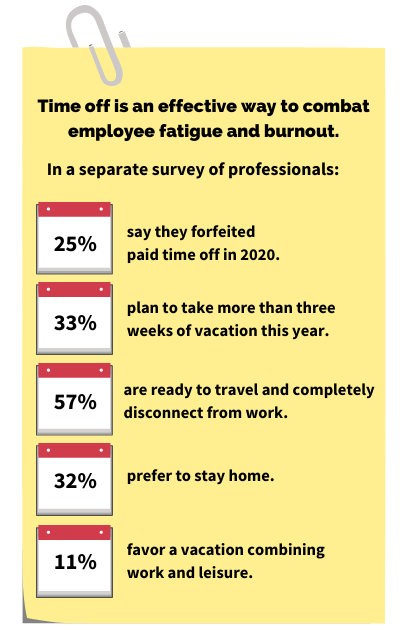Expectations to stay connected contribute to employee burnout
 Last summer there was nowhere to go and no one to go with. Thanks to vaccinations, things are looking up this summer. And right on time, as employees are reporting feeling burned out. A recent survey conducted by Robert Half reveals that 44% of professionals say they’re more burned out on the job today compared to a year ago. Last year 34% said they felt burned out. Nearly half of employees—49%—who are experiencing increased fatigue blame it on a heavier workload.
Last summer there was nowhere to go and no one to go with. Thanks to vaccinations, things are looking up this summer. And right on time, as employees are reporting feeling burned out. A recent survey conducted by Robert Half reveals that 44% of professionals say they’re more burned out on the job today compared to a year ago. Last year 34% said they felt burned out. Nearly half of employees—49%—who are experiencing increased fatigue blame it on a heavier workload.
These findings won’t come as a shock to most, as more than 30% of adults now report symptoms consistent with an anxiety or depressive disorder. However, that doesn’t make them unimportant. In fact, maintaining employee satisfaction is even more vital as the economy moves back into swing and some employers find themselves unable to fill vital positions easily.
Time off is an effective way to combat employee fatigue and burnout. With opportunities for vacations returning, employers should encourage their employees to take them. However, the model for vacation time that many employers follow in practice greys the lines between time off and time on. Not letting employees properly unplug may just perpetuate a cycle of burnout and poor mental health.
Vacations, unplugged
Yes, it’s easier to stay in touch with the office while you’re on vacation. No, it’s probably not such a good idea. The Robert Half survey also revealed how much of an issue this is: 28% of respondents admit they’ll check in with work frequently when they take time off this summer.
In a separate survey of professionals:
- 25% say they forfeited paid time off in 2020.
- 33% plan to take more than three weeks of vacation this year.
- 57% are ready to travel and completely disconnect from work.
- 32% prefer to stay home.
- 11% favor a vacation combining work and leisure.
It’s no cliché to say employees benefit from vacations. So model the behavior you want employees to adopt. When you take time off, don’t call in, don’t email don’t text unless it’s an emergency. Leave your work in the hands of a trusted colleague.
The right to disconnect
In 2016, the French government adopted a law giving employees a “right to disconnect.” While it leaves room for interpretations and negotiation, the gist of the law is that employees are not required to take calls or check emails outside of their working hours. While such legislation is unlikely to pass in the US, the french might be on to something.
That employees are being pressured to return phone calls and emails at all hours isn’t really news now. What isn’t so apparent is the impact this constant availability and the inability to switch off is having on employees. Employees have reported:
- Lack of sufficient rest
- Working while sick (also known as virtual presenteeism)
- Less physical activity
- Higher levels of anxiety.
Why does this happen? Employees say it’s mostly because their employers haven’t put in place measures to prevent them from overusing technology for work.
To know if this is a problem at your company, look at the volume of emails and texts with time stamps beyond employees’ regular working hours. Does this vary department by department? Could only certain managers be culprits in promoting an always-on expectation?
 The responsibility falls on the employer
The responsibility falls on the employer
Since you can’t turn off the internet, you must teach employees and their managers to effectively manage their availability and working time. While every company is different, here are some general tips you might find useful to help you get started:
- Determine why employees can’t disconnect. Are you severely understaffed? Are managers not distributing work equitably?
- Reinforce to employees that disconnecting won’t make the company question their loyalty or commitment to doing good work. It’s just the opposite — employees who are stressed can’t fulfill their potential.
- Define working and non-working hours. Stress that sneaking in a little work over the weekend isn’t acceptable.
- Unless there are extraordinary circumstances, which should be clearly defined and communicated, employees shouldn’t be disciplined for not working during off-hours.
- Discipline managers who continue to send off-hours emails to their staff. The right to disconnect applies to them, too.
- Monitor employees through regular status checks and confidential questionnaires.
You can also let technology work for you by having a warning pop up on employees’ screens if they seek to send an off-hour email. If your email app allows, use the scheduling feature to embargo sending after-hours emails; then follow up with those employees. You can also encourage employees to turn on their automatic email reply at the end of the day.
Consider updating your policies
Here are some suggestions for beefing up your vacation policy to ensure employees are offline when off work.
[NAME OF COMPANY] recognizes that every employee is entitled to switch off while on vacation and enjoy their free time away from work without being disturbed, unless there is an emergency or agreement to do so, for example, while “on call.”
Here’s language to include if you worry supervisors will pester their vacationing subordinates with emails and texts.
- When a manager emails or texts employees who are on vacation, unless business and operational needs dictate an immediate response, a statement must be attached to the communication tempering the expectation of an immediate response.
- The manager should give due consideration to the timing of their communication and potential for disturbance and the recipient should understand they will not be expected to respond until they return to work.
Remind employees about to go on vacation to set their email auto-reply for incoming emails and change their voicemail to inform callers when they will return. Urgent matters can be referred to a colleague.
And if that doesn’t do it, here are two additional tips:
- Block employees from accessing their email and voicemail while they’re away; assign urgent matters to someone else.
- Penalize employees who don’t take enough time by making this a factor in their annual performance reviews. (Call it poor time management.)






